Related Research Articles

Princeton University is a private Ivy League research university in Princeton, New Jersey. Founded in 1746 in Elizabeth as the College of New Jersey, Princeton is the fourth-oldest institution of higher education in the United States and one of the nine colonial colleges chartered before the American Revolution. The institution moved to Newark in 1747, and then to the current site nine years later. It officially became a university in 1896 and was subsequently renamed Princeton University.
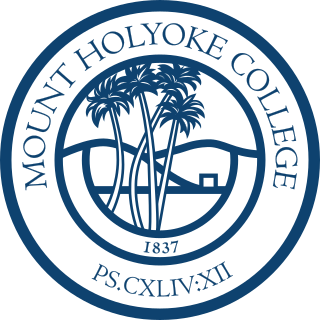
Mount Holyoke College is a private liberal arts women's college in South Hadley, Massachusetts. It is the oldest member of the historic Seven Sisters colleges, a group of historically female colleges in the Northeastern United States. The college was founded in 1837 as the Mount Holyoke Female Seminary by Mary Lyon, a pioneer in education for women. Mount Holyoke is part of the Five College Consortium in Western Massachusetts.
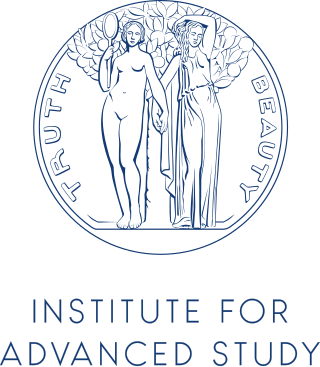
The Institute for Advanced Study (IAS) is an independent center for theoretical research and intellectual inquiry located in Princeton, New Jersey. It has served as the academic home of internationally preeminent scholars, including J. Robert Oppenheimer, Albert Einstein, Hermann Weyl, John von Neumann, and Kurt Gödel, many of whom had emigrated from Europe to the United States.
The Hampshire College Summer Studies in Mathematics (HCSSiM) is an American residential program for mathematically talented high school students. The program has been conducted each summer since 1971, with the exceptions of 1981, 1996, and has more than 1500 alumni. Due to the Coronavirus pandemic, the 2020 Summer Studies ran online for a shortened program of four weeks.

Smith College is a private liberal arts women's college in Northampton, Massachusetts. It was chartered in 1871 by Sophia Smith and opened in 1875. It is the largest member of the historic Seven Sisters colleges, a group of women's colleges in the Northeastern United States. Smith is also a member of the Five College Consortium, along with four other nearby institutions in the Pioneer Valley: Mount Holyoke College, Amherst College, Hampshire College, and the University of Massachusetts Amherst; students of each college are allowed to attend classes at any other member institution. On campus are Smith's Museum of Art and Botanic Garden, the latter designed by Frederick Law Olmsted.

The College of Creative Studies is the smallest of the three undergraduate colleges at the University of California, Santa Barbara, unique within the University of California system in terms of structure and philosophy. Its small size, student privileges, and grading system are designed to encourage self-motivated students with strong interests in a field to accomplish original work as undergraduates. A former student has called it a “graduate school for undergraduates”. The college has roughly 350 students in eight majors and approximately 60 professors and lecturers. There is an additional application process to the standard UCSB admission for prospective CCS students, and CCS accepts applications for admissions throughout the year.
Kenneth Ira Appel was an American mathematician who in 1976, with colleague Wolfgang Haken at the University of Illinois at Urbana–Champaign, solved one of the most famous problems in mathematics, the four-color theorem. They proved that any two-dimensional map, with certain limitations, can be filled in with four colors without any adjacent "countries" sharing the same color.

Grove City College (GCC) is a private, conservative Christian liberal arts college in Grove City, Pennsylvania. Founded in 1876 as a normal school, the college emphasizes a humanities core curriculum and offers 60 majors and 6 pre-professional programs with undergraduate degrees in the liberal arts, sciences, business, education, engineering, and music. Though once associated with the Presbyterian Church, the college is now unaffiliated.
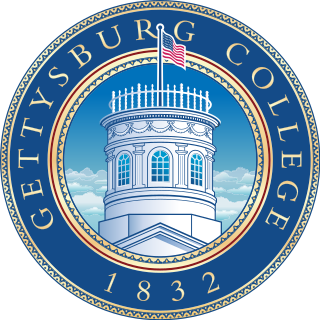
Gettysburg College is a private liberal arts college in Gettysburg, Pennsylvania. Founded in 1832, the 225-acre (91 ha) campus is adjacent to the Gettysburg Battlefield. Gettysburg College has about 2,600 students, with roughly equal numbers of men and women. Gettysburg students come from 41 states, Washington, D.C., and 39 countries.
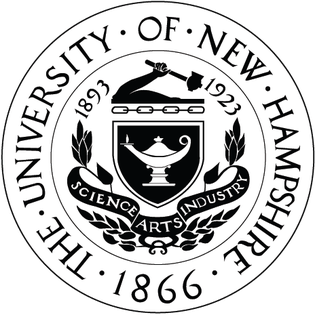
The University of New Hampshire (UNH) is a public land-grant research university with its main campus in Durham, New Hampshire. It was founded and incorporated in 1866 as a land grant college in Hanover in connection with Dartmouth College, moved to Durham in 1893, and adopted its current name in 1923.

Bennington College is a private liberal arts college in Bennington, Vermont, United States. Founded in 1932 as a women's college, it became co-educational in 1969. It claims to be the first college to include visual and performing arts as an equal partner in the liberal arts curriculum. It is accredited by the New England Commission of Higher Education.
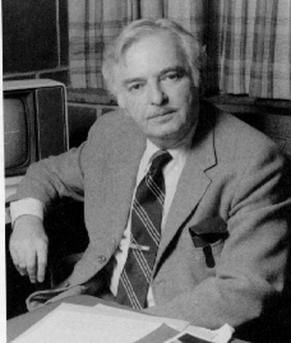
John George Kemeny was a Hungarian-born American mathematician, computer scientist, and educator best known for co-developing the BASIC programming language in 1964 with Thomas E. Kurtz. Kemeny served as the 13th President of Dartmouth College from 1970 to 1981 and pioneered the use of computers in college education. Kemeny chaired the presidential commission that investigated the Three Mile Island accident in 1979. According to György Marx he was one of The Martians.

Albert William Tucker was a Canadian mathematician who made important contributions in topology, game theory, and non-linear programming.

The Summer Science Program (SSP) is an academic summer program where high school students experience college-level education and do research in celestial mechanics by studying the orbits of asteroids, biochemistry by studying the kinetic properties of enzymes, or genomics by studying antibiotic resistance. The program was established in 1959 at The Thacher School in Ojai, California. It now takes place on three astrophysics campuses, New Mexico Tech in Socorro, New Mexico, the University of North Carolina at Chapel Hill in Chapel Hill, North Carolina, and University of Colorado, Boulder in Boulder, Colorado, and two biochemistry campuses, Purdue University in West Lafayette, Indiana and Indiana University Bloomington in Bloomington, Indiana.
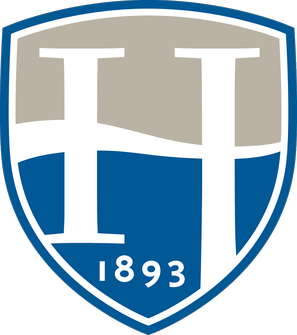
Hood College is a private college in Frederick, Maryland. In fall 2018, Hood enrolled 2,052 students. Thirty-eight percent of students are either members of under-represented racial or ethnic populations or from foreign countries.

The Courant Institute of Mathematical Sciences is the mathematics research school of New York University (NYU), and is among the most prestigious mathematics schools and mathematical sciences research centers in the world. Founded in 1935, it is named after Richard Courant, one of the founders of the Courant Institute and also a mathematics professor at New York University from 1936 to 1972, and serves as a center for research and advanced training in computer science and mathematics. It is located on Gould Plaza next to the Stern School of Business and the economics department of the College of Arts and Science.

Saint Anselm College is a private Benedictine liberal arts college in Goffstown, New Hampshire. Founded in 1888, it is the third-oldest Catholic college in New England. Named for Saint Anselm of Canterbury, the college continues to have a fully functioning and independent Benedictine abbey attached to it, Saint Anselm Abbey. As of 2017, its enrollment was approximately 2,000.

The Princeton University Department of Mathematics is an academic department at Princeton University. Founded in 1760, the department has trained some of the world's most renowned and internationally recognized scholars of mathematics. Notable individuals affiliated with the department include John Nash, former faculty member and winner of the 1994 Nobel Memorial Prize in Economic Sciences; Alan Turing, who received his doctorate from the department; and Albert Einstein who frequently gave lectures at Princeton and had an office in the building. Fields Medallists associated with the department include Manjul Bhargava, Charles Fefferman, Gerd Faltings, Michael Freedman, Elon Lindenstrauss, Andrei Okounkov, Terence Tao, William Thurston, Akshay Venkatesh, and Edward Witten. Many other Princeton mathematicians are noteworthy, including Ralph Fox, Donald C. Spencer, John R. Stallings, Norman Steenrod, John Tate, John Tukey, Arthur Wightman, and Andrew Wiles.
References
- ↑ Hampshire College honors retiring math professor David Kelly with 17 mph speed limit signs, October 16 2015
- ↑ "Hampshire College Faculty Bio" . Retrieved Jan 22, 2012.
- ↑ "Why Yellow Pigs?" . Retrieved Jan 22, 2012.
- ↑ "YP Day Songs".
- 1 2 Laura A. Haight (1982-02-05). "Hamming It Up At Hampshire: Mathematics Gone Hogwild". Harvard Crimson . Retrieved 2007-03-04.